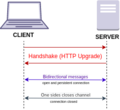Cross-site request forgery, also known as one-click attack or session riding and abbreviated as CSRF (sometimes pronounced sea-surf) or XSRF, is a type...
30 KB (3,749 words) - 16:12, 5 September 2024
otherwise not be directly accessible to the attacker. Similar to cross-site request forgery which utilizes a web client, for example, a web browser, within...
2 KB (216 words) - 11:00, 25 October 2024
HTTP cookie (redirect from Same-site cookie)
to the website to which the cookie belongs (see cross-site scripting and cross-site request forgery for examples). Tracking cookies, and especially third-party...
93 KB (10,970 words) - 06:19, 4 October 2024
JSONP (section Cross-site request forgery)
with malicious data. Naive deployments of JSONP are subject to cross-site request forgery (CSRF or XSRF) attacks. Because the HTML <script> element does...
15 KB (1,769 words) - 15:00, 22 September 2024
List of HTTP header fields (redirect from HTTP request header field)
January 19, 2014. "SAP Cross-Site Request Forgery Protection". SAP SE. Retrieved January 20, 2015. "Django Cross Site Request Forgery protection". Django...
53 KB (2,476 words) - 07:37, 24 September 2024
JavaScript (category Cross-platform software)
browser authors. Another cross-site vulnerability is cross-site request forgery (CSRF). In CSRF, code on an attacker's site tricks the victim's browser...
95 KB (9,317 words) - 23:14, 1 November 2024
Cross-site may refer to the following network security exploits: Cross-site cooking Cross-site request forgery Cross-site scripting Cross-site tracing...
194 bytes (55 words) - 04:12, 28 December 2019
solved to a great extent. This technique is also useful against cross-site request forgery attacks. The session identifier on most modern systems is stored...
18 KB (2,566 words) - 16:12, 18 October 2024
program's own permission to access the file is used implicitly. A cross-site request forgery (CSRF) is an example of a confused deputy attack that uses the...
9 KB (1,222 words) - 13:09, 21 June 2024
cross-application request forgery (CARF) is the equivalent of cross-site request forgery (CSRF) in desktop applications. In CARF the concept of “link”...
3 KB (459 words) - 00:03, 10 December 2021
Same-origin policy (section Read access to sensitive cross-origin responses via reusable authentication)
to infer information about cross-origin. Cross-origin resource sharing Cross-site scripting Cross-site request forgery Site isolation Content Security...
17 KB (1,921 words) - 08:38, 31 October 2024
Cross-site cooking is similar in concept to cross-site scripting, cross-site request forgery, cross-site tracing, cross-zone scripting etc., in that it involves...
3 KB (379 words) - 00:43, 4 December 2021
only be set by the browser. Cross origin resource sharing Same origin policy Cross-site scripting Cross-site request forgery While there are other possible...
65 KB (7,527 words) - 16:48, 5 September 2024
Web development (redirect from Web site programming)
common vulnerabilities, including SQL injection, cross-site scripting (XSS), and cross-site request forgery (CSRF). Authentication and authorization mechanisms...
39 KB (4,681 words) - 17:55, 1 November 2024
however, chaining it with a cross-site request forgery vulnerability escalates its impact to that of typical cross-site-scripting. In the past, a very...
6 KB (552 words) - 19:04, 9 October 2024
to foil BREACH in individual attack scenarios, such as using cross-site request forgery (CSRF) protection. Another suggested approach is to disable HTTP...
6 KB (701 words) - 09:02, 9 October 2024
to the website to which the cookie belongs (see cross-site scripting and cross-site request forgery for examples). Tracking cookies, and especially third-party...
91 KB (9,215 words) - 22:55, 31 October 2024
connection establishment, to avoid cross-site WebSocket hijacking attacks (similar to cross-site request forgery), which might be possible when the connection...
49 KB (3,673 words) - 12:27, 10 October 2024
verifies CSRF tokens for form submissions, protecting against cross-site request forgery attacks. Authentication and Authorization: Laravel provides built-in...
27 KB (2,575 words) - 09:58, 10 September 2024
applications tools for generating Sitemaps built-in mitigation for cross-site request forgery, cross-site scripting, SQL injection, password cracking and other typical...
36 KB (2,404 words) - 00:54, 25 October 2024
might be able to take over the entire server. Cross-site request forgery (CSRF) is creating client requests that do malicious actions, such as an attacker...
26 KB (3,274 words) - 09:49, 17 October 2024
this will not protect against attacks such as Firesheep. ArpON Cross-site request forgery HTTP cookie TCP sequence prediction attack Bugliesi, Michele;...
13 KB (1,588 words) - 23:06, 26 October 2024
Processes CSRF—Cross-Site Request Forgery CSS—Cascading Style Sheets CSS—Content-Scrambling System CSS—Closed Source Software CSS—Cross-Site Scripting CSV—Comma-Separated...
92 KB (6,571 words) - 19:15, 31 October 2024
Hiawatha (web server) (category Cross-platform free software)
v8.6) Hiawatha aimed to prevent SQL-injection, cross-site scripting (XSS), Cross-site request forgery (CSRF), and denial-of-service attacks. It allowed...
9 KB (772 words) - 02:14, 29 August 2024
examples of security exploits are SQL injection, cross-site scripting and cross-site request forgery which abuse security holes that may result from substandard...
55 KB (5,981 words) - 21:25, 14 August 2024
Web Messaging (redirect from Cross-document messaging)
Presto layout engines. Cross-site scripting Cross-site request forgery Same-origin policy Cross-origin resource sharing JSONP Cross-Document Messaging –...
7 KB (641 words) - 14:45, 10 May 2024
concerns such as phishing, credit card handling, session fixation, cross-site request forgeries, compliance, and privacy issues. OWASP Testing Guide: The OWASP...
19 KB (1,584 words) - 15:57, 25 October 2024
to defeat referer checking controls that are used to mitigate Cross-Site Request Forgery attacks. Several software tools exist to facilitate referer spoofing...
4 KB (533 words) - 23:53, 16 July 2024
open redirections by overwriting the window.location attribute, cross-site request forgery, or even gain arbitrary code execution via careful manipulation...
15 KB (1,734 words) - 05:56, 8 April 2024
validation Contains various security features to avoid Cross-site scripting and Cross-site request forgery (CSRF) vulnerabilities Includes a compact C++ ORM-layer...
8 KB (777 words) - 09:08, 10 July 2024







